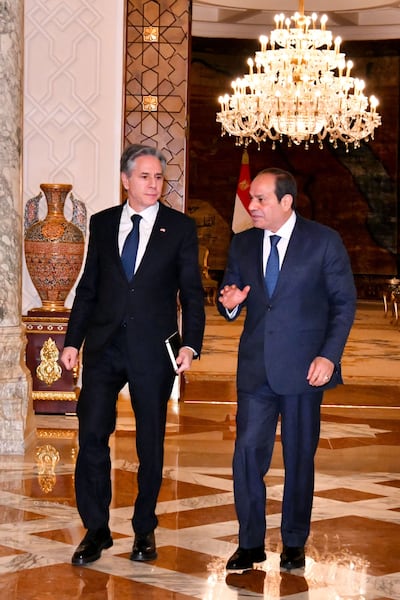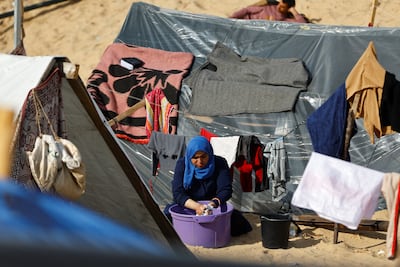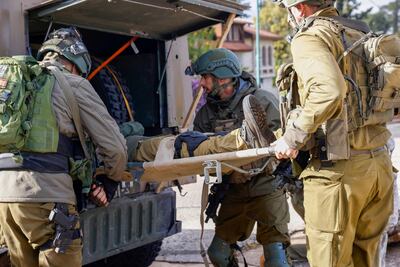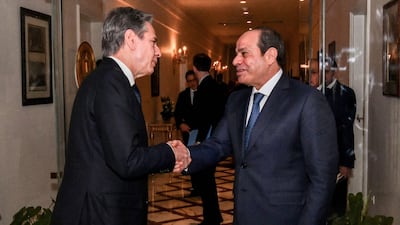Live updates: Follow the latest news on Israel-Gaza
US Secretary of State Antony Blinken wound up a week-long tour of the Middle East in Cairo on Thursday, offering a rough vision to end the Palestinian-Israeli conflict, centring on security guarantees for Israel and the creation of an independent Palestinian state.
During his tour, the fourth since the Gaza war broke out more than three months ago, Mr Blinken met Israeli and Palestinian officials and leaders of neighbouring Arab states with a stake in the Israeli-Palestinian conflict or whose support is needed for postwar plans in Gaza and the occupied West Bank.
A statement issued on Thursday by the Egyptian presidency after Mr Blinken’s talks with President Abdel Fattah El Sisi revealed little about the substance of their discussions, saying only that the Egyptian leader emphasised to Mr Blinken the need to end the war and resolve the Palestinian question based on a two-state solution.
“The two sides were in agreement to continue contacts with all parties to push forward efforts for a ceasefire and to prevent a wider conflict as well as the total rejection of the principle of or attempt to evict the Palestinians,” said the statement.
'Two paths' for region
Speaking to reporters later, Mr Blinken said the region faced two paths.
One path could see “Israel integrated, with security assurances and commitments from regional countries and as well from the United States, and a Palestinian state – at least a pathway to get to that state,” according to Mr Blinken.
“The other path is to continue to see the terrorism, the nihilism, the destruction by Hamas, by the Houthis, by Hezbollah, all backed by Iran,” he said.
“If you pursue the first path … that's the single best way to isolate, to marginalise Iran and the proxies that are making so much trouble – for us and for pretty much everyone else in the region.”

Tour with wide-ranging goals
Mr Blinken's public statements have been light on details, but diplomats and sources who spoke to The National said he appeared to have different goals from each country he visited.
The sources said that one of Mr Blinken's goals was to rally support for a US-led naval coalition to deal with threats to Red Sea shipping lanes posed by Yemen’s Iranian-backed Houthis.
He also sought to secure financial support from Gulf Arab states for the reconstruction of Gaza and discussed the possible participation of Turkey in a multinational force to be deployed in Gaza after the war.
Mr Blinken also had to address the concerns of Arab nations such as Jordan and Egypt over the fallout from the Gaza war, argue against criticism of Washington’s widely perceived bias in favour of Israel, and work to de-escalate the threat of a wider regional war involving Iranian-backed armed groups from Lebanon and Syria to Iraq and Yemen.
Throughout his visit, Mr Blinken did not voice support for Arab demands for a ceasefire in Gaza, the sources said.
Instead, he focused on potential humanitarian pauses and the release of hostages held by Hamas, advocating Israel’s right to self-defence while pointing out that Washington has called on Israel to do more to protect civilians and allow more aid into Gaza.
Risks of instability
Jordan and Egypt cautioned Mr Blinken that a prolonged war in Gaza as envisaged by Prime Minister Benjamin Netanyahu carries the risk of instability in the region, according to the diplomats and sources.
“At the end of the day Hamas is a radical religious movement, and the war is increasing support for Islamists regardless of whether Israel wins or not in Gaza,” said a senior European diplomat who recently discussed the war with Egyptian officials in Cairo.
He said Egyptian officials have repeatedly warned US envoys, including Mr Blinken, that even if Israel succeeds in realising its goal of destroying Hamas, which has committed to destroy Israel, the militants will recover and attack Israel again.
President El Sisi has said that any expulsion of Palestinians into Egypt would endanger his nation’s national security, explaining that Israel would feel compelled to target Palestinians on Egyptian soil if attacked by militants based there.
Like Jordan, Egypt signed a peace treaty with Israel. Egypt and Israel have over the past decade worked in close co-operation on security, counterterrorism, and combating cross-border drug smuggling and human trafficking, but relations have deteriorated since the Gaza war began.
Mr Blinken’s visit to the region came three months into the fifth and most devastating Israel-Hamas war since 2008. Israel’s relentless bombardment of Gaza has killed more than 23,300 Palestinians, displaced most of Gaza’s 2.3 million residents, and laid waste to large areas of the densely populated coastal strip.
The war was triggered by Hamas's October 7 attack on southern Israel, when the group and other militants killed 1,200 people and took about 240 hostages back to Gaza.

Negotiations stalled
Mr Blinken’s talks in Cairo came as a mediation bid by US allies Egypt and Qatar to end the war appeared to stall. Hamas has reportedly cooled on the deal after one of its top leaders was killed last week in Lebanon in a targeted attack blamed on Israel.
Israel has also made a range of demands that have been rejected by Egypt and Hamas over the governance of Gaza after the war.
Israel rejects the inclusion of Hamas in any postwar governance and security arrangements. Israel has also voiced strong reservations on the involvement of the Palestinian Authority, which oversees limited self-rule in the West Bank.

Mr Binken has said Washington wants the Palestinian Authority to undertake reforms and regain credibility in order to take charge of Gaza if and when Israel achieves its goal of eliminating Hamas, which has run the strip since 2007.
Another hurdle to the Qatari-Egyptian mediation is Israel’s declared intention to create buffer zones on the eastern and northern flanks of Gaza to deny militants direct access to Israel.
The suggestion has been rejected by both Egypt and Hamas, together with plans for a multinational force to be deployed in the strip until a suitable governance formula is found.
Some far-right members of Mr Netanyahu's coalition government have openly called for Palestinians to leave Gaza and Israelis to settle there permanently. In a post on X, Mr Netanyahu insisted this was not Israel's aim.
“I want to make a few points absolutely clear: Israel has no intention of permanently occupying Gaza or displacing its civilian population,” he wrote.
But Egypt, according to the sources, is already alarmed by the movement of hundreds of thousands of displaced Palestinians close to the Gaza side of the border, fearing that a spike in Israeli strikes in the area could force them to cross into Egypt in search of safety.
“They are literally less than 50 metres away from the fence,” said one of the sources of the Palestinians gathered near the Egyptian border in the Sinai Peninsula.
Egypt is also angered by Israeli demands to install electronic surveillance devices on the Gaza side of the border with Egypt, ostensibly to halt the smuggling of weapons or dual-use material that could be used by Hamas.
A Mossad delegation was in Egypt earlier this week to discuss what Egypt could do to accelerate a prisoner and hostage deal between Israel and Hamas, according to the sources, who have direct knowledge of the contacts.
“The Mossad is focused on freeing the hostages held by Hamas, but the group is unlikely to do that unless it’s part of a deal that includes a ceasefire and withdrawal of Israeli troops from Gaza,” said another source.


